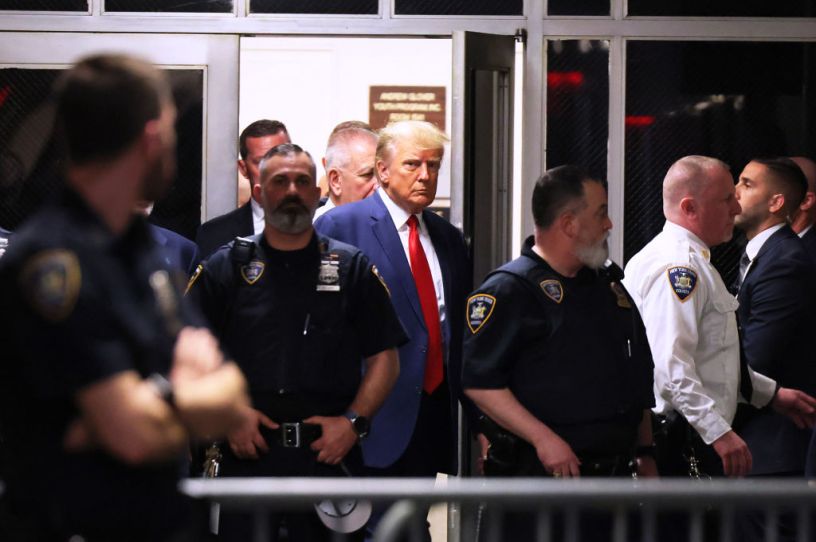Donald Trump’s Other Legal Woes, Explained

Former President Donald Trump was formally arraigned Tuesday in Manhattan on 34 charges of falsifying business records.
But the case against Trump in New York may be the least of his legal worries: He could soon face serious accusations in Georgia for attempted interference in the 2020 election and in federal court for mishandling classified documents.
Here is where those cases stand.
Classified documents.
The federal investigation into Trump’s handling of classified documents is being overseen by special counsel Jack Smith (who is also leading a parallel Justice Department investigation into Trump’s conduct on and around January 6, 2021).
At issue is an apparent violation of the Presidential Records Act: After leaving office, Trump kept hundreds of classified documents he wasn’t supposed to keep. But as we’ve learned in the months since the FBI searched Trump’s home at Mar-a-Lago in August, improperly handling classified documents isn’t unusual among high-ranking elected officials: President Joe Biden and former Vice President Mike Pence held onto old documents as well.
The apparent ubiquity of the alleged crime may make Smith’s investigation more politically fraught. But evidence has continued to emerge that Trump may have obstructed justice: The Washington Post reported this week that investigators suspect Trump personally looked through boxes of the classified materials after being served with a subpoena in May—after which he returned some, but not all, of the documents, paving the way for the FBI’s execution of a search warrant to recover the rest.
The grand jury for the investigation has recently heard testimony from a steady stream of witnesses, including Mar-a-Lago staff and some of Trump’s own lawyers. Last month, a judge ruled that one of them in particular, Evan Corcoran, could be compelled to answer questions normally covered by attorney-client privilege. Prosecutors seem to be interested in whether Trump misled his lawyers last summer, telling them he had turned over all the classified documents when he knew he had not.
Multiple Secret Service agents are reportedly set to testify on Friday.
Georgia election interference.
The investigation into potential criminal wrongdoing in Georgia by Trump and his allies dates to February 2021. The case revolves around Trump’s attempt to overturn the results of the 2020 presidential election in Georgia, including a call to Secretary of State Brad Raffensperger asking him to “find 11,780 votes” almost a month after the state legislature certified the results (and the state’s electoral college votes).
The investigation picked up steam in January 2022, when a judge granted Fulton County District Attorney Fani Willis’s request to form a special purpose grand jury.
In Georgia, a regular grand jury serves a two-month term deciding whether to hand down indictments. But Chief Judge Christopher Brasher gave the special purpose grand jury up to a year to investigate and decide whether to recommend indictments. While the special grand jury’s work is now complete, the DA may still be investigating, and a regular grand jury will ultimately decide whether to issue any indictments in the case.
The special purpose grand jury subpoenaed and deposed a number of high-profile Trump allies and Georgia officials, including Rudy Giuliani, John Eastman, Michael Flynn, South Carolina Sen. Lindsey Graham, Georgia Gov. Brian Kemp, and Raffensperger. In its final report, the special grand jury said that some witnesses may have perjured themselves.
If a regular grand jury ultimately decides to indict Trump—a decision which could come soon—Willis will need to argue that the former president’s conduct in pressuring state legislators and elected officials to change the election results violated Georgia state law.
“The baseline assumption is that these will be election fraud charges or interference with an election, and those kinds of charges can be inclusive of everything from the phone call Donald Trump made to Brad Raffensperger, to potential harassment of election workers, to perhaps some kind of conspiracy to to intimidate other elections officials,” said Anthony Kreis, a law professor at Georgia State University. “It’s very wide ranging.”
Under Willis’ leadership, the DA’s office has demonstrated a knack for finding novel applications for RICO (Racketeer Influenced and Corrupt Organizations) charges, which are usually associated with the mafia and involve “multiple people who are engaged in a kind of broad conspiracy but who don’t necessarily know what the other parties are doing,” Kreis said. In this case, that could include people like Giuliani, Eastman, and Meadows as well as Trump. (Ironically, Giuliani first earned notoriety by pioneering the use of RICO charges as a federal prosecutor in New York.)
For Trump to be convicted on RICO charges, Willis would have to show that the people involved in the pattern of racketeering intended to do something criminal, and intent can be hard to prove. Trump’s lawyers could argue that his beliefs about the 2020 election being stolen were genuinely held even if they were wrong. But while the evidence Willis has been gathering remains secret for now, Trump continues to publicly cling to the stolen election claims.
As in Manhattan, so in Atlanta: Trump’s lawyers would likely file motions to dismiss the charges. If that motion failed and the case went to trial, venue and jury selection would loom large: Trump’s lawyers would likely ask for the trial to be moved elsewhere in the state, arguing that a trial in Fulton County in the Atlanta metro area wouldn’t be fair because most potential jurors would be biased against Trump.
“Any defense attorney worth their salt is going to zealously represent the former president and take advantage of every credible argument that they can,” Kreis said.
And that will be true throughout the entire process. A conviction would bring about appeals to the Georgia Court of Appeals, the Georgia Supreme Court, the U.S. Supreme Court. “This could drag on for years,” said Robert Leider, a law professor at George Mason University.